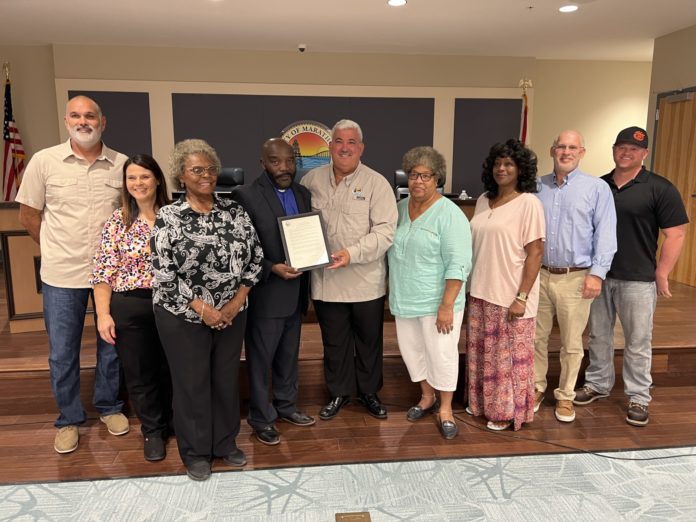Spirited debates abounded at the Marathon City Council’s Jan. 10 meeting as the council wrestled with fee reductions for building permits and BPAS points, many of which members of the community have overpaid for in the last few years.
In an effort to reduce the city building department’s excessive reserves, city staff asked the council for clear direction in a potential reduction of building permit fees for Marathon residents. The extensive surplus built over the last few years was buoyed largely by increased development in Marathon since Hurricane Irma and extensive fees collected in relation to Grassy Key’s upcoming Valhalla Resort construction.
The current $4 million in reserves is legally impermissible according to Florida statute, which allows for a reserve equal to the department’s average expenses over the prior four years. As Marathon finance director Jennifer Johnson informed the council Tuesday night, that number is roughly $1.6 million for Marathon. Permit fees collected may only be used to enforce the Florida building code and may not be transferred for use in other departments.
City attorney Steve Williams informed the council that the two-year retroactive reduction in fees — and the corresponding refunds – that drew initial support from the council could wade into ethically questionable waters. Records obtained by the Weekly indicate that at least four of the five council members or their families have paid permit fees in the last 15 months and would likely be eligible for a refund with a retroactive reduction.
A two-year retroactive reduction would include enough Marathon residents to avoid triggering a clear conflict of interest as outlined by the Florida Commission on Ethics. According to the commission, a council member may not vote on an action that would benefit a group of residents smaller than one to two percent of Marathon’s population if he or she would be included in that group.
However, if any of the council members would receive a refund that was “disproportionately high” compared to the average amount refunded, the council member would be required to recuse himself or herself from the vote, possibly preventing the council from reaching a quorum and taking official action.
Keys Weekly has submitted a records request for permit fees paid by all council members since the city’s building permit software launched in December 2020, as well as the average fees paid per applicant over the same period, but results were not yet available as of press time.
With an official vote tabled for the council’s February meeting, Williams will meet with each council member to determine their status in relation to the average refund owed and explore options with the ethics commission for council members possibly donating their refunds to charity.
A discussion of fees paid by applicants to earn additional points in the Building Permit Allocation System (BPAS) brought another debate. As currently written, applicants in the system may donate buildable lots and sums of cash – calculated in proportion to the value of one acre of conservation land – in exchange for up to 11 points in the system’s rankings.
Many residents have publicly decried the system, viewing the “extortion fee,” as it was humorously referred to by councilman Kenny Matlock, as a “pay to play” donation that provides a roadblock for long-term locals while allowing developers who can pay the price tag to continue receiving allocations.
With allocations dwindling and eligible lots becoming harder to find, the value of conservation land – and the resulting required donations – has skyrocketed exponentially. The council voted in July 2022 to double the fee from $18,200 to $36,400, but the current value is now estimated at a whopping $115,000.
With only four BPAS periods remaining, council members debated the impacts of waiving fees for residents currently in line for owner-occupied homes as well as the merits of changing Marathon’s code to lessen the financial burden for long-term residents looking to gain additional points in the system.
With no clear language in Marathon’s code defining how closely the fees must follow fluctuations or averages in appraised value, the council unanimously voted to reaffirm the $36,400 fee, with the caveat that applicants already in BPAS before July 2022 will be assessed the fees in place at the time of their application’s filing.
In Other News
- After a second discussion led by Vice Mayor Robyn Still, council members directed city staff to move forward with re-establishing a program to provide grant funding to nonprofits that assist working residents in Marathon. With a total amount, eligibility criteria and a selection process to be established at February’s meeting, applicants would likely be evaluated by an advisory group of city staff before making recommendations to the council for final approval.
- A conditional use permit for the development of a restaurant and bar, retail space and 10 affordable housing units behind the existing Gulfside Village plaza was eventually approved after concerns expressed by residents and council members. With a design that initially included a marina, applicant David Crum indicated that recent surveys of the area bay bottom and grass beds would make the marina portion of the development more difficult than anticipated.
Citing an extreme need for affordable housing in the community, council members inquired about their ability to insert additional conditions in their approval that would ensure construction of the affordable units with rental rates feasible for low-income families.
However, as informed by planning director Brian Shea, the property’s commercial zoning already allows for construction of a restaurant following the clearing of exotic vegetation, and any attempts to levy additional conditions could result in the applicant scrapping the housing units and resulting conditional use permit while still proceeding with the restaurant.
When asked directly by the council, Crum said he was unwilling to voluntarily tie the development of affordable housing to his commercial plans.
- A second conditional use permit for a five-home development dubbed “Shipman Point” behind the newly-completed Crystal Cove apartments between 47th and 50th Street Gulf, along with a new city ordinance to address the maintenance and use of private streets like the one required in the development, were also unanimously approved.
- Mirroring Monroe County’s recently extended lease with the Pigeon Key Foundation, the council unanimously approved a 30-year lease agreement for space at the upcoming Seven Mile Marina. Pigeon Key will use the space for parking, ticketing, train parking and an eventual gift shop and small visitor’s center when interior space becomes available at the property. The lease is subject to review and adjustment every three years.
- Williams and Garrett announced that a settlement in the ongoing litigation over the Boatworks development at the end of 39th Street Gulf should be available for the council’s approval before its next meeting.



























